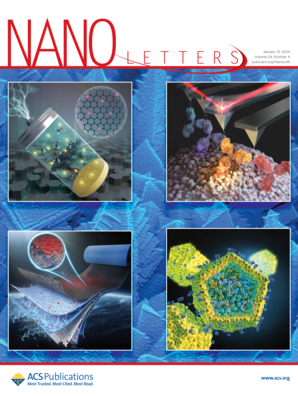Low Power Ternary State Channel Computing-in-Memory Transistor for Federated Learning.
IF 9.6
1区 材料科学
Q1 CHEMISTRY, MULTIDISCIPLINARY
引用次数: 0
Abstract
Federated learning is a communication collaborative learning architecture that protects personal privacy. Utilization of the ternary weight changes can efficiently reduce the communication workload and energy consumption of federated learning, which is beyond the realization of most single transistors. Here, we demonstrate a ternary state channel computing-in-memory transistor that can generate three conductivity states at a minimum ternary voltage of 5 mV for low-power computing and can distinguish the direction of weight changes for federated learning. The transistor has a relatively gentle conductivity state, where the current remains almost constant as the number of voltage pulses increases. Detection of this relatively gentle conductivity state can program the change of ternary weights in a single transistor. Based on these characteristics, the total communication bits were reduced by 83.3% in a custom federated learning task. The ternary state channel transistor shows potential as a basic hardware unit for ternary computing.用于联邦学习的低功耗三态信道内存计算晶体管。
联邦学习是一种保护个人隐私的通信协作学习体系结构。利用三元权值变化可以有效地减少联邦学习的通信工作量和能耗,这是大多数单晶体管无法实现的。在这里,我们展示了一个三元状态通道内存计算晶体管,它可以在低功耗计算的最小三元电压为5 mV时产生三种电导率状态,并且可以区分权值变化的方向,用于联邦学习。晶体管具有相对温和的导电性状态,当电压脉冲数增加时,电流几乎保持恒定。对这种相对温和的电导率状态的检测可以对单个晶体管中三元权重的变化进行编程。基于这些特征,在自定义联邦学习任务中,总通信位减少了83.3%。三元态通道晶体管显示出作为三元计算基本硬件单元的潜力。
本文章由计算机程序翻译,如有差异,请以英文原文为准。
求助全文
约1分钟内获得全文
求助全文
来源期刊

Nano Letters
工程技术-材料科学:综合
CiteScore
16.80
自引率
2.80%
发文量
1182
审稿时长
1.4 months
期刊介绍:
Nano Letters serves as a dynamic platform for promptly disseminating original results in fundamental, applied, and emerging research across all facets of nanoscience and nanotechnology. A pivotal criterion for inclusion within Nano Letters is the convergence of at least two different areas or disciplines, ensuring a rich interdisciplinary scope. The journal is dedicated to fostering exploration in diverse areas, including:
- Experimental and theoretical findings on physical, chemical, and biological phenomena at the nanoscale
- Synthesis, characterization, and processing of organic, inorganic, polymer, and hybrid nanomaterials through physical, chemical, and biological methodologies
- Modeling and simulation of synthetic, assembly, and interaction processes
- Realization of integrated nanostructures and nano-engineered devices exhibiting advanced performance
- Applications of nanoscale materials in living and environmental systems
Nano Letters is committed to advancing and showcasing groundbreaking research that intersects various domains, fostering innovation and collaboration in the ever-evolving field of nanoscience and nanotechnology.
 求助内容:
求助内容: 应助结果提醒方式:
应助结果提醒方式:


